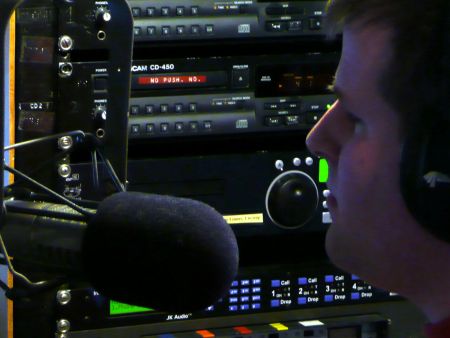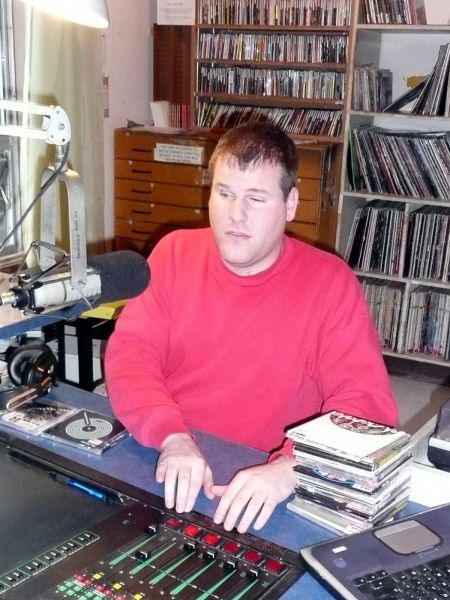HALIFAX – Every Monday, listeners tune into CKDU 88.1FM to hear host, Adam Noble count down Halifax’s top 30 albums on the popular chart show Radio Numerica. They would never know that Noble is blind.
“I hope to help more people who are blind or visually impaired become involved in radio and to get their voices heard,” says Noble.
Like many people living with disabilities, Noble encounters societal barriers in activities that others may take for granted, like hosting a radio show. He and his allies at campus and community stations aim to change this, by giving support to the voices of people with disabilities and making radio stations more accommodating to their needs.
With the help of Noble and other disability-conscious radio volunteers, the National Campus and Community Radio Association (NCRA) is compiling a guidebook and accompanying audio disc to distribute to its 74 campus and community member stations across the country. The handbook is scheduled to be complete by spring. The authors hope it will increase radio programming on disability issues, as well as to encourage stations to analyze accessibility in their own spaces and ultimately promote an accommodating environment for people with disabilities.
“Ideally,” says NCRA Membership Coordinator Shelley Robinson, “All people [will] have full access to our stations and our processes so they can suggest and make the changes themselves, from the inside.”
That’s exactly what Noble did when he began volunteering in the campus and community radio field in 1998 at CHSR 97.9FM in Fredericton, New Brunswick before joining the CKDU team in 2008.
Noble was initially drawn to campus and community radio by his love for music, but was also intrigued by an atmosphere that welcomed a diversity of individuals. “The staff and volunteers have been very helpful to me,” he says. “Each Monday when I host Radio Numerica, CKDU’s music director makes sure I have the CDs I need and that the top 30 chart is accessible for me.”
“I used to be an extremely shy person and was afraid to ask for help if I needed it,” says Noble. “Once I moved out on my own I soon realized that I needed to overcome [shyness] or I wouldn’t make it by myself.”
Many community spaces fail to accommodate a wide scope of physical and mental disabilities. Accessibility is a common obstacle within public spaces: buildings often lack wide corridors for walkers and wheelchairs, and few public places are functional for the visually impaired. Noble gives the example of “walking into an office building and trying to find a certain floor in an elevator but there isn’t any Braille on the keypad.”
André St. Jacques, a volunteer at CHUO 89.1FM in Ottawa, faces similar constraints in his wheelchair.
CHUO is located in the sub-basement of the Morrisset library at the University of Ottawa campus. St. Jacques’ mobility limitations force him to depend on elevator service. On Thursday evenings he must be at the radio station one hour before his midnight show since the facilities department turn off the elevators at eleven o’clock. “I was constantly being locked out if I did not arrive on time, and then it was always a struggle to get out of the building once the show was over,” says St. Jacques. “The station manager fought with the school administration and now the University is more aware of the challenges.”
Cooperation between staff and volunteers at CHUO played a significant role in St. Jacques’ radio experience. “No one has made me feel like I don’t have a voice,” he says. Alongside hosting and co-hosting three French programs on the airwaves, St. Jacques is a member of the station’s Board of Directors and speaks up on behalf of disability needs.
Staff support was crucial in enabling Noble to establish CHSR as a functional space for the Blind. “When I started at CHSR the staff and volunteers were very excited to work on making the station accessible,” he says. “The first job was to put Braille labels on all of the equipment in the master control room as well as the production studio.”
Making a space accessible for disabled persons also involves educating the able-bodied people who share the space. For instance, there are programmers who peel away at the Braille labels - an anxious habit while hosting on air – and eventually remove the labels unknowingly.
Pierre Loiselle worked alongside Noble during the construction of a disability-conscious space at CHSR in Fredericton. “Challenges [from a staff perspective] included mobilizing the membership to be considerate to the needs of people with varying abilities,” says Loiselle, “[such as] getting the membership aware that they had to place their bags on a chair as opposed to the floor, not move the furniture around, and if any temporary changes were made, things had to be put back in their place immediately afterward.”
However, supportive staff and Braille labeling alone do not make a space accessible for the Blind. Specialized equipment for the visually impaired is also required, but the equipment is costly and these purchases are expensive for radio stations with small budgets. For instance, Job Access With Speech (JAWS) is a screen-reading software program that reads aloud everything on the computer screen. Noble has been using JAWS for twelve years but he had to spend $1000 out of his own pocket.
“Once you are finished school there is no funding that I know of that will help buy equipment for persons with disabilities,” he says. “There are definitely some challenges [associated with having a disability] but with new technology that’s available, slowly it gets easier.”
In order to mobilize awareness for a Blind-functional radio station in Halifax, staff members at CKDU are seeking funding from the federal government for a contract position for Noble. The goal of the short-term contract will be to make the studios at CKDU more accessible by installing screen-reading software, offering training for Blind programmers, addressing disability awareness in general volunteer orientation, and communicating with the membership about the technological and physical features of the space.
Whilst the campus and community radio handbook will initiate conversation regarding disability issues, stations across the country have a long way to go in order to be considered accessible. When speculating about the number of disability-conscious community radio stations in Canada, Robinson states: “[T]o be honest, I have no idea how many [stations] have volunteers with disabilities or can accommodate people with disabilities, especially since there are so many [disabilities] to consider.”
There is still a long way to go, but Noble has helped make CKDU a more accessible space for blind programmers so others like him may have the opportunity to work in radio. “I’ve had an extremely positive experience in radio. I remember my first time on the air I was scared to death. With lots of practice eventually I began to relax and have a lot of fun.”
“I always tell people to never be afraid to ask me questions about my disability. I would rather people ask me stuff than assume things. People need to understand that just because I’m blind I can do just as much as someone who is sighted.”
Radio Numerica broadcasts Mondays 1:30-3:30AT on CKDU 88.1FM or www.ckdu.ca.
Gianna Lauren is a radio enthusiast, vegan baker, musician and writer. She hosts a weekly female focused news and music program on CKDU called Third Wave Radio.




